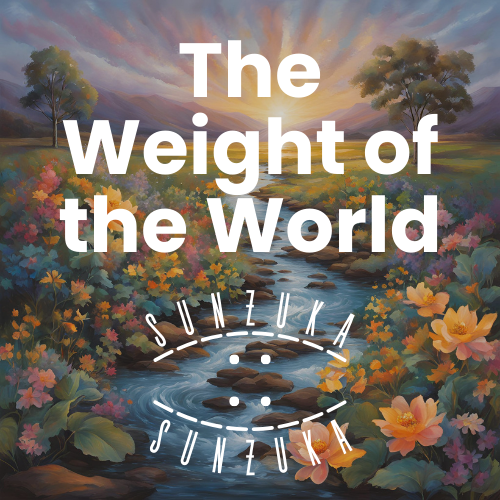What is Suffering? A Deep Exploration
- Sun Zuka
- Mar 6, 2025
- 4 min read
Suffering is one of the most complex and debated aspects of the human experience. It touches every life in different ways, yet its origins and nature remain elusive. In a recent discussion, the idea arose that all suffering is self-inflicted. The perceptive was received as selfish. But the intention was never selfishness—only an exploration of truth.
Suffering, at its most basic definition, is a painful or distressing experience. It can be physical or mental, ranging from mild discomfort to unbearable agony. Yet suffering is not just an objective occurrence; it is profoundly subjective. What one person perceives as suffering, another may see as a challenge, an opportunity, or even an inconsequential event. This suggests that suffering is not just about what happens but about how it is interpreted.
If suffering is in the eye of the beholder, then does that mean it is created from within? And if so, can it also be dismantled from within?

Suffering as a Perspective
Suffering is self-inflicted, consciously or unconsciously. This idea aligns with many spiritual and philosophical traditions, particularly Buddhism, which teaches that suffering arises from unawareness, attachment, and resistance. The world itself does not create suffering; rather, suffering is born from the reaction to the world.
Pain may be inevitable, but suffering is optional. Consider two individuals who experience the same event—a job loss, a breakup, a physical injury. One falls into despair, while the other sees it as a lesson, an opportunity for change. The event is the same, but the experience is different. This is because suffering is not in the thing itself but in the relationship to it.
This is where the paradox deepens: If suffering is self-inflicted, does that mean people enduring immense pain—such as those facing war, illness, or profound loss—are choosing to suffer? This is where compassion must enter the conversation. To say suffering is self-inflicted is not to diminish another’s pain but to recognize that each person has power over their responses.
Can Suffering or Prosperity Be Inherited?
Can suffering or prosperity be passed from one person to another? While it is not possible to directly experience someone else’s suffering in the way they do, it is possible to be affected by it. Empathy allows for the feeling of another’s emotions, but does feeling another’s suffering mean it becomes one's own?
If suffering is a perspective, then no, it cannot be inherited. However, indirect experiences can be influential. A person who is close to someone suffering deeply may feel sorrow, anxiety, or distress—but these emotions are their own, shaped by personal perception.
In the same way, success and prosperity cannot be transferred. Two people in the same conditions can have entirely different experiences based on how they perceive and respond to their environment. The only true control in this world lies in actions and reactions. When acting from a place of balance, from love rather than fear, that steadiness radiates outward. That ripple effect, while powerful, does not override another’s personal process.
The Way Out is In: Processing Experience
Thich Nhat Hanh said, “The way out is in.” This speaks to the struggle with balancing internal processing with external teaching. If all actions and reactions ripple outward, then the first responsibility is to oneself. Steadiness, balance, and wholeness must come first before guiding others.
But what does it mean to be steady? It does not mean ignoring suffering, suppressing pain, or dismissing the experiences of others. Instead, it means fully engaging with direct experiences—welcoming them, understanding them, and learning from them. Indirect experiences, those that come from others, can be observed, acknowledged, and then released. They inform, but they do not define.
Suffering comes from rejecting direct experience. When resisting what is happening, when wishing for reality to be different than it is, suffering is created. The opposite—acceptance—is not passive resignation but an active embrace of life as it unfolds. Prosperity, in this sense, is not material wealth but a deep, inner flourishing that comes from being present with life as it is.
The Paradox of Speaking and Silence
A significant struggle has been this: If still processing personal experiences, should suffering be spoken about? And if all that is said comes through a personal lens, can it truly apply to others?
This is the dilemma of every teacher, every thinker, every seeker. No one has a universal truth—only perspectives shaped by experience. But that does not mean silence is the answer. Instead, speaking should come with awareness, humility, and openness to the perspectives of others.
Perhaps the key is not to declare suffering as one absolute thing but to invite exploration. Rather than saying, “All suffering is self-inflicted,” perhaps it is more fruitful to ask, “How much power do I have over my own experience?”
A rigid truth creates resistance, but an open question invites growth. And isn’t growth the very thing that transforms suffering into something else entirely?
Conclusion: Finding Balance in Being and Teaching
Suffering, like beauty, exists in the eye of the beholder. It is shaped by perception, by attachment, by the stories told to oneself. To say that suffering is self-inflicted is not an act of selfishness—it is an acknowledgment of personal power. But this perspective must be held with compassion. Not everyone is ready to see suffering as self-created, and not everyone should be expected to.
The balance, then, lies in personal steadiness. Processing personal experiences must come first. Finding peace in direct reality. And when speaking, let it not be from a place of rigid knowing but from a place of love and openness. The way out is in, and the way forward is together.


Comments